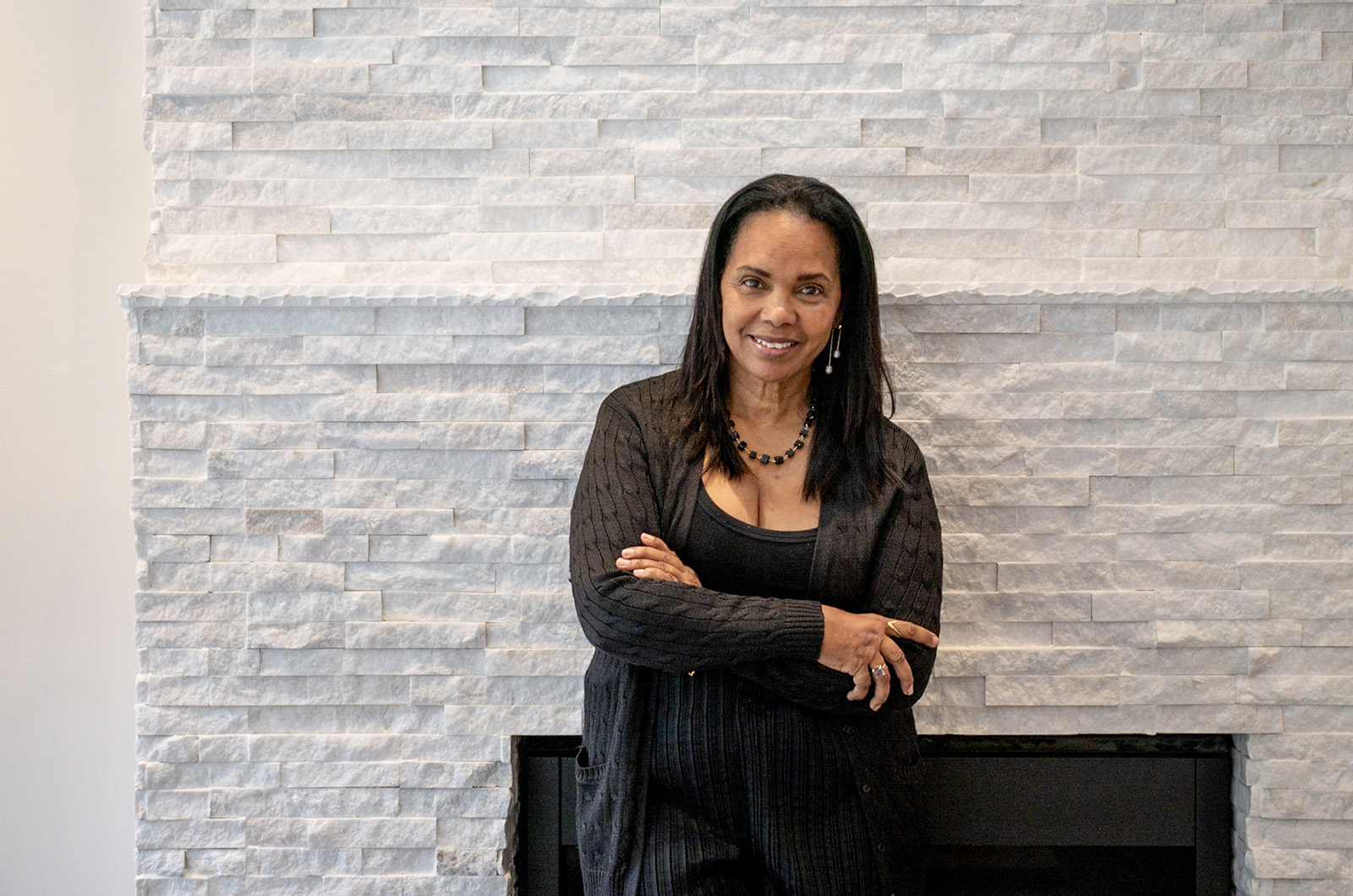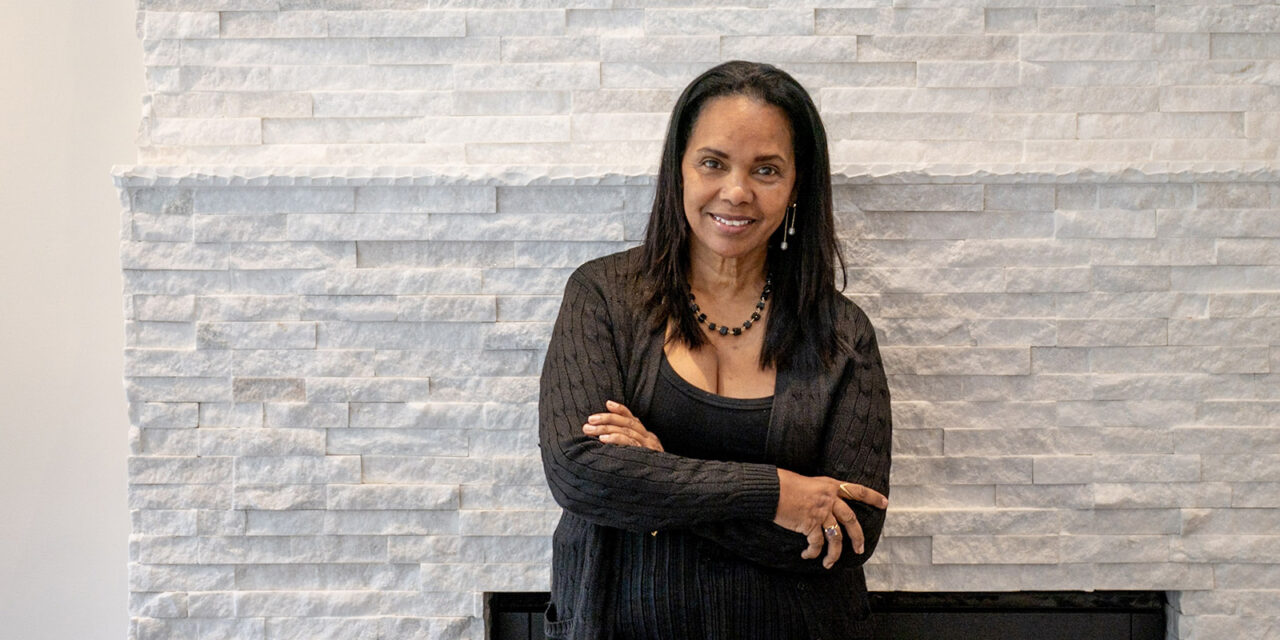
At an early age, Priscilla Sims Brown discovered the value of female mentorship and a strong will. Born in the U.S. in 1957 to Ethiopian parents who returned to Africa a few years later, Ms. Brown was raised primarily in Germany by an American military family, and moved several times before reaching adulthood.
Her upbringing was unsteady and unconventional, but she learned quickly to forge her own future by watching the footsteps of the women around her.
Today, Ms. Brown, a seasonal Vineyard resident, is the chief executive officer of Amalgamated Bank, the largest union-owned bank in the country. She is one of few women of color leaders in the financial sector, and has made a name for herself as a distinctively vocal advocate of several social campaigns, including those for gun safety, climate justice, reproductive rights and more.
In an interview with the Gazette at her house in Oak Bluffs, Ms. Brown reflected on her career and the people who helped shape it, and how, despite a lifetime living around the world, she always returns to the Vineyard.
“Year-round I’m here as much as I can be,” said Ms. Brown, who otherwise lives in Philadelphia and New York City. “This is just my happy place, where I can let everything else go for awhile.”
Ms. Brown said that her outspokenness is not always well received. And in an industry that is largely white and male-dominated, she said that she stands out even without her explicit stances on the country’s most topical issues.
But in moments of doubt, Ms. Brown turns to the women in her life for a reminder of why her work is worth the challenges.
“When I was younger, I looked to women who were much older,” she said. “Now it’s especially younger women who push the paradigm differently than I do. They grew up in a new world and therefore seem to push even harder. I have a lot of mentees, but I am also sort of reverse mentored by them.”
Ms. Brown joined Amalgamated in 2021 after spending two years at the Commonwealth Bank in Sydney, Australia. While living there, she witnessed online the murder of George Floyd and the resurgence of Black Lives Matter in 2020.
Feeling distant from the movement, Ms. Brown longed to return to the states. When she got the call from Amalgamated, which is based in New York, she saw it as a perfect opportunity to engage with causes she felt absent from for too long.
Amalgamated’s history is rooted in advocacy. The bank was founded in 1923 by the Amalgamated Clothing Workers of America labor union to serve specifically female immigrant garment workers who were often refused service by other financial institutions. It has since supported several labor strikes over poor working conditions by financing workers’ bail payments and offering interest-free loans.
Ms. Brown knew that she had a significant legacy to uphold.
“I came to Amalgamated and thought, what can I do to venture us into new ground?” she said. “Well, I just have to continue to push the envelope further.”
Last year, Ms. Brown led the bank’s campaign to establish a new merchant category code for gun stores at the International Organization for Standardization (ISO). The four-digit codes are used to classify businesses and monitor types of financial transactions. Before 2022, they did not exist for firearm sellers.
The idea, Ms. Brown said, is to ensure that Amalgamated and other companies are doing everything possible to prevent financing anything illegal. The code makes the process of buying a gun more secure, but does not restrict a citizen’s right to own one.
Ms. Brown and her team received threats from Second Amendment supporters, but she remained firm in her decision to promote gun safety.
“We use the same merchant codes for every other industry to stop all sorts of crime… like human trafficking or money laundering,” she said. “If we can do that with those crimes, we should not be financing gun crime.”
Ms. Brown also uses her position to push for climate change mitigation, and keeps the bank’s standards for environmental consciousness and transparency high. Over one third of the company’s loans are devoted to green energy and other climate solutions, she said, despite the volatility of the renewables market that makes banks sometimes wary to invest.
“We understand the risk,” said Ms. Brown. “But we have a lot of work to do. There may be a little instability as the [renewables] industry is maturing, but we believe in it.”
On days when her work feels especially onerous, there is one woman in particular she looks to for guidance.
“My mother was the first woman senator in Ethiopia,” said Ms. Brown. “She saw no barriers. We liked to laugh that our favorite thing is to run into burning buildings.”
Her mother, Marta Gabre-Tsadick, died earlier this year, and Ms. Brown spent the eight months caregiving and reconnecting with family in Ethiopia. Though grieving, she said the visit allowed her to reflect deeply on her mother’s achievements and the work that she herself still hopes to accomplish.
Moving transcontinentally several times, Ms. Brown has had to call many places home. But for her, it is a community’s people — especially women of color — who keep her drawn to a place, and revitalize her to continue her advocacy.
On her first trip to the Vineyard in the 1970s, Ms. Brown, then a college student, found a natural connection with the women in the Oak Bluffs Camp Ground. Over the decades, she returned to the Island every year with her children, and in 2017, she purchased her home in Oak Bluffs.
The Island, she said, is a place that she is certain will remain in her life forever.
“Here on the Vineyard, it’s the people I’ve gotten to know all of these years who draw me back time after time,” she said. “When I’m driving across the Bourne Bridge or when I finally reach the ferry, I take this deep breath and I am happy.”



